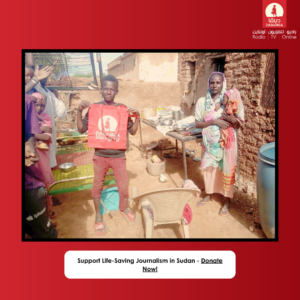Reporter banned from newspaper and TV
A Sudanese reporter was banned from writing for one of the newspapers on Saturday. On Monday, the security service seized the entire print-run of the newspaper.
 Columnist Abdelbagi El Zafir has been banned from writing for El Saiha newspaper and also banned from appearing on Omdurman satellite TV (file photo)
Columnist Abdelbagi El Zafir has been banned from writing for El Saiha newspaper and also banned from appearing on Omdurman satellite TV (file photo)
A Sudanese reporter was banned from writing for one of the newspapers on Saturday. On Monday, the security service seized the entire print-run of the newspaper.
Columnist Abdelbagi El Zafir has been banned from writing for El Saiha newspaper after revealing details about the ruling party in a report. “This decision is a sad one,” the writer told Radio Dabanga.
“I was informed of the decision on Saturday, and the ban is indefinite. The decision proves the government’s inability to deal with different voices, and this indicates that the future atmosphere will not hold any democratic change in Sudan.”
El Zafir claimed that the Sudanese Journalists’ Union has not been stirred into action and did not communicate with him, “even at the social level”, about the ban. He has also been banned from appearing on Omdurman satellite TV.
The ban by the security service (NISS) happened against the background the publication of a report that contained partisan and organisational secrets about a recent decision to re-nominate President Omar Al Bashir for a third term in the elections.
The ruling party, the National Congress Party (NCP), decided to amend its party’s constitution last August to make Al Bashir’s third nomination possible – a move that has been criticised widely. The decision will now require amendments to the constitution of Sudan.
The report, written by El Zafir, included details from closed NCP meetings concerning the decision.
Chairman of the Board of Directors of El Saiha, El Tayeb Mustafa, said that the authorities notified them orally about the ban of El Zafir from writing in the newspaper.
The ban follows a new draft Press and Publications Act which the Cabinet approved in June. It provides for the suspension of journalists from writing and the expansion of powers of the Press and Publications Council.
Confiscations
Sudan Tribune reported that the National Intelligence and Security Service seized copies of El Saiha newspaper from the printing press on Monday, without providing any reason.
The NISS said in a meeting with editors-in-chief in August that there are ‘red lines’ that must not be crossed by news media, including issues related to the president of Sudan. For the time being, new confiscations of newspapers were temporarily suspended.
The same month, however, the distribution of El Jareeda newspaper was repeatedly delayed by the NISS because of its critical content.
The security service routinely seizes copies of newspapers, to either prevent circulation of certain articles or to punish them retroactively for breaching the unwritten red lines. More often than not the moves inflict financial losses on the affected news media.
The country is ranked at the bottom of the World Press Freedom Index by the global monitoring organisation Reporters Without Borders (RSF).











 and then
and then